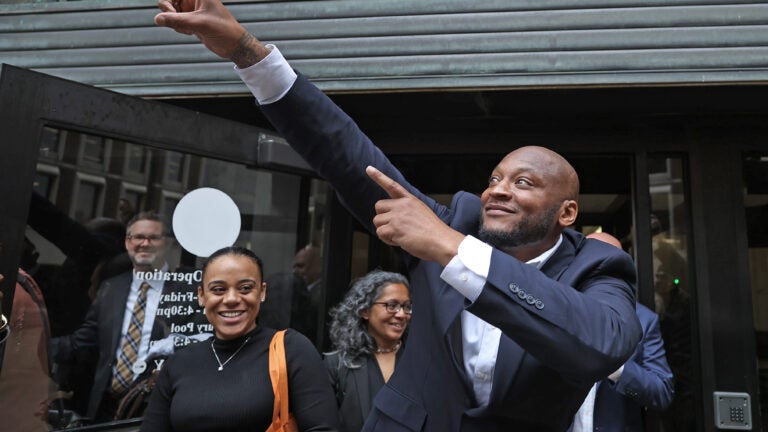Crime
The man was sentenced to life in prison in 1998 after he was found guilty of murdering a convenience store clerk.

Ricky McGee, who was convicted in 1998 for a Boston murder and sentenced to life in prison, is now a free man after prosecutors determined that he did not receive a fair trial.
Prosecutors filed a motion Nov. 3 in Suffolk Superior Court to drop the charges against McGee after finding a lack of concrete evidence and considering new evidence that weakened the testimony of the prosecution’s main witness, according to court filings.
McGee said he was “overjoyed” about the decision in an audio message obtained by GBH News.
“Just coming to the end of my criminal case was so vital and pivotal, not just for me but for my family,” McGee said.
McGee was 19 years old when he was arrested, and while he’s still adjusting to life as a free man after decades behind bars, he’s “creating a path forward for myself because that’s what I owe me,” he said.
McGee was indicted in July 1997 by a Suffolk County grand jury after Geta Yalew was fatally shot April 16, 1997 while working at Christy’s Market in Boston’s Fenway neighborhood, according to court documents. Prosecutors said McGee entered the store at around 2 a.m. that morning and robbed Yalew at gunpoint, then shot him in the head.
Yalew was pronounced dead at Beth Israel Hospital later that morning, court documents show. The prosecution further alleged that in the days after the murder, McGee had admitted to friends that he had robbed the store and shot the clerk.
McGee’s statements were “corroborated by other evidence,” and a search warrant executed July 11, the same day he was arrested, yielded “clothing, ballistics and other evidence” which allegedly linked him to the murder. Two weeks after his arrest, McGee was indicted by a grand jury, according to court documents.
The next year, McGee was found guilty of first-degree murder, armed robbery, and carrying a firearm without a license. After a two-week trial, he was sentenced to life in prison Oct. 20, 1998 for the murder charge, court records show.
During his time in prison, McGee, who had maintained his innocence from the start, repeatedly filed motions for a new trial, but they were all denied. Court filings from February 2014 show that McGee motioned for a re-trial due to newly discovered evidence and alleged that a Boston police sergeant had intimidated a potential witness.
The prosecution primarily depended on the testimony of two witnesses, who testified that McGee had told them he had committed the murder, according to court filings. There was no physical evidence tying McGee to the scene of the crime.
In the 2014 filing, McGee called into question the legitimacy of the two witnesses’ testimony, alleging that there was evidence to indicate that they each had a motive to lie. Furthermore, he alleged that Randy Farrell, a friend of his who had initially agreed to testify, later declined to do so due to fear of self-incrimination.
Farrell’s testimony would have revealed that he was illegally in possession of a firearm, according to court filings. However, while waiting to testify, he encountered Boston Police Sergeant Detective Daniel Keeler, who advised him that “if he admitted possession of a handgun he would be prosecuted, and that he should ‘take the [F]ifth.’”
After meeting with an attorney, Farrell asserted his Fifth Amendment right not to testify, court filings show. However, a judge ruled that Keeler had not intimidated or threatened Farrell on the grounds that their encounter was unplanned.
The 2014 ruling concluded that Farrell’s testimony, among other reintroduced evidence, would not have exonerated McGee of the charges against him, and as such, the motion for a new trial was denied. The Supreme Judicial Court later “affirmed the defendant’s convictions and the denials of his two motions for a new trial,” court documents show.
After years of continuing to request records and motion for a new trial based on discovered evidence, McGee was released on personal recognizance Oct. 14, according to court records.
“The Commonwealth undertook a comprehensive investigation of the claims raised by the defendant, including locating and reinterviewing critical witnesses, interviewing individuals who were involved in the criminal investigation and prosecution, and investigating new evidence in the case,” prosecutors wrote in court documents dated Oct. 2. “After a thorough review of the facts and application of the relevant law, the Commonwealth has concluded that a confluence of factors created a substantial risk of a miscarriage of justice in the defendant’s case and therefore warrants a new trial.”
In McGee’s final motion for a new trial, dated March 15, 2024, he alleged police misconduct related to Natasha Hamilton, the prosecution’s chief witness, court documents show. The Court later elaborated Dec. 10, 2024 that the alleged misconduct involved “‘withholding or otherwise tainting the evidence available to the defense.’”
GBH reported that investigators further found evidence that Hamilton had been protected from prosecution for bank fraud in exchange for her testimony. Investigator John Nardizzi, working with other defense investigators, uncovered possible witness tampering.
Prosecutors interviewed several people involved with the case again and determined that Hamilton had collected a $25,000 reward from Christy’s after testifying, therefore giving her a motive to lie. Due to the possibility of alleged misconduct that “could have been a real factor in the jury’s deliberations,” Judge Michael Ricciuti granted McGee a new trial Oct. 27, court documents show.
In the Commonwealth’s nolle prosequi dated Nov. 3, the Suffolk County District Attorney’s Office stated that the new evidence “created a substantial risk of a miscarriage of justice.” Furthermore, they indicated that “no evidence currently exists that can be forensically tested or retested” to corroborate the witnesses’ testimonies.
Jeffrey Harris, McGee’s attorney, did not immediately respond to a request for comment Thursday night, but he told GBH that he was “thrilled that Mr. McGee’s conviction was vacated and that the case was dismissed.”
Beyond McGee’s case, the ruling could also have an impact on other convicted defendants. Judge Ricciuti told prosecutors that they were obligated to investigate the Boston homicide detectives who worked on McGee’s case to determine whether they had committed similar misconduct in other cases.
“If there’s an officer who did what they did here, and did it somewhere else, there are other defendants who have a right to know it,” Ricciuti said in a court recording obtained by GBH.
No one from the Boston Police Department was immediately able to comment on the case or the involved officers’ alleged misconduct Thursday night.
Sign up for the Today newsletter
Get everything you need to know to start your day, delivered right to your inbox every morning.



